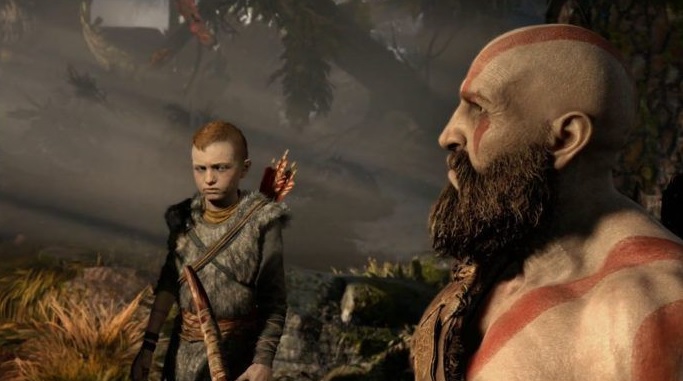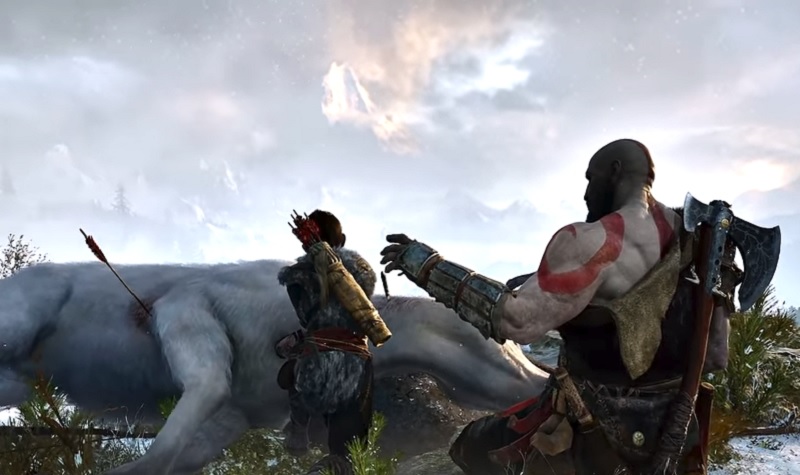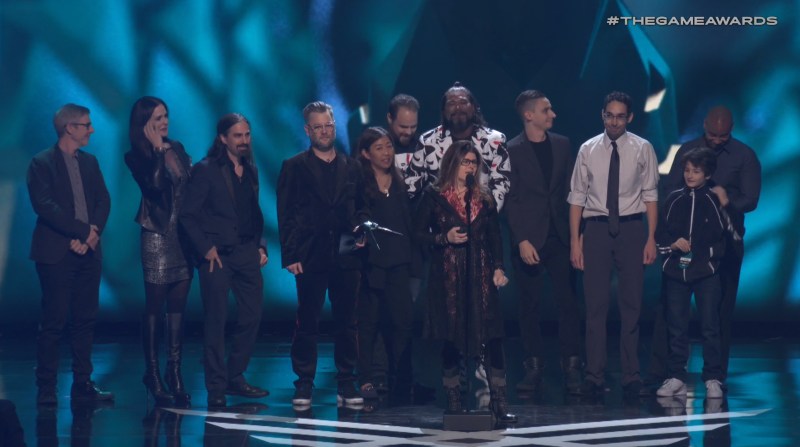
Above: Kratos must control his temper and show patience to his son in God of War.
GamesBeat: Sometimes I wonder if the thing that goes through game designers’ heads—“We have a nice story here, but how can we stretch it out 10 more hours? People don’t want a 6-hour game.” Is there ever actual pressure to make a longer experience?
Barlog: Not at Sony, not at Santa Monica. We’ve never had that. In fact, it’s usually the opposite. “Oh my gosh, too big, too much, get rid of it, we can’t do this!” I kept trying to convince people that the game was 20 hours: 10 hours for story, 10 hours of exploration. I was convincing them for a couple of years before the reality set in, that there was no way this was 20 hours. Then I was able to switch tactics and say, “I know, but we’re already invested. We understand what we’re going to do. We can do this. Let’s just be economical and find a way.”
Some of it’s a trick we play on each other. But for me, I didn’t want to make it long for the sake of being long. I’ve learned from long-format storytelling, like great seasons or multiple seasons of television, that the best payoffs are these longer payoffs. I don’t feel like just learning something and then paying it off an hour later. It’s cool, but the weight isn’t there. The feeling of experiencing this entire thing and then having a realization, the weight is so much stronger. It allows you to take your time.
We, in the game industry, are far more analogous to the storytelling of TV in how we’re dragging things out and having moments. Great TV still can have an off episode, but that episode gives you the breather, the palate cleanser, to appreciate the on episode, the one after that. If you just cram it all together — it’s difficult for movies sometimes, because they want to make multiples. Here’s movie one of a five-part series! The movie doesn’t feel like it pays off, because you wait a couple of years for the next one. Whereas with Spider-Man: Into the Spider-Verse, people are saying it’s a world in and of itself. The whole thing is an inclusive experience where I got what I wanted from beginning to end. I walk out wishing I could see more of that, but I don’t feel like I’m waiting for a payoff.
For me, that was the big thing in our game. I wanted people to be able to have a complete experience like I had when I was a kid. I’d take a game home and it wasn’t like, maybe the developer will give me a bit more later. You got it all. You got the entire experience there, and then you wondered what might happen next.
GamesBeat: Sometimes I feel like at least half of a great story is a good beginning and a good ending. If you have that it all pulls together. Last of Us has a beginning that resonates back through the ending. You guys have that too. The funny thing, when I was talking to Neil Druckmann, he was saying that in the latest Uncharted, they didn’t know what the beginning would be. They had this swordfighting thing and they weren’t sure if the mechanic was going to work. Eventually it did work, but they took it out of the beginning and had it in the ending. They wanted to have the symmetry in the swordfighting at the beginning and the ending, but for some reason it didn’t work.
He said that they never do the beginning until they know which mechanics are going to work in the game, and they’re sure that they’re not going to throw something out. You can’t have a swordfight in the beginning of the story if it doesn’t work mechanically yet. I wondered if you have a similar approach, if your beginning wasn’t there yet.
Barlog: It’s interesting, because we’ve always done the beginning last. What we ended up using for the beginning was something we were doing, but thinking we were throwing out. It was based on a short story that I wrote in the first year, to get everybody comfortable with the idea. I wrote it in the style of that Cormac McCarthy story about the father and his son. I never said “Kratos” or “Atreus” in the story. It was just the father and the son going out hunting.
That was a tone piece to help people think, “OK, I can see that. I get it. I see where you’re going.” And then we had to keep doing these things where—OK, we have to come up with a vertical slice. We don’t have anything? Let’s just use that short story. When we were brainstorming the beginning of the game, well, let’s use that short story. It ended up becoming this thing we kept leaning on. Surprisingly, we were doing the beginning of the game very early.
The elements, the real heart of the elements, came after we had cemented everything else. Things we were adding to it that really made it much better. Uncharted 4’s beginning, getting out of the orphanage, I thought that was so good. Such a brilliant beginning. The beginning of Last of Us was done in the last bit of the game. They’d done it, and apparently they had to reshoot everything, because they had a better idea.
That, right there, is why they’re the top of the game. They realize they have a better idea. They know it’s a better idea. Or they believe in it, so they’re willing to take the flying leap. I try to live that as much as possible. When there’s something better, it doesn’t matter what the consequences are going to be. We have to follow that. We have to say, “This is going to make it better. Let’s do it.”

Above: Kratos tries to comfort his son in God of War. Tries, but fails.
GamesBeat: It sounds like you can’t get wed to your story, either. You can’t say, “This is the beginning, the middle, the end, I want it to be this way.” You find, at the end of the process, that you could rip it up.
Barlog: Sometimes what you’re doing is figuring out how pliable you are. There are certain anchors throughout the story, anchors that I still argue about with the writers today in some cases. But they’re non-negotiable. Those things won’t move. They’re important. They need to be there, because everything fans out from there. But by nature, we want to mess with everything. Knowing which things to say, “Nope, this is too far, can’t mess with that, but here, that’s fine.”
When you get to see everything together—we had a unique experience on this one in that we were constantly revising and writing the whole game. We didn’t have any “a ha” realization at the end. Everything worked out, because we’d gone “a-ha” all the way through. I think our big realization was that we had to cut a huge chunk and we needed to figure out how to fill it. What we filled it with made the game better. It surprised me. “Why didn’t we do this before? This is amazing!”
So in some ways it was great that we cut that, but—not only being flexible with the story, but knowing what not to be flexible with. You can easily get lost. I see a lot of games where they lose the thread because they cut too much. They rewrite a few things, and all of a sudden they don’t realize that they’ve just completely, fundamentally changed the story.

Above: God of War wins game of the year at The Game Awards.
GamesBeat: You thanked David Jaffe onstage at The Game Awards, which I thought was interesting. Bonnie Ross yesterday, she got the Hall of Fame award from the Academy of Arts and Interactive Sciences. In both cases, the thing you’re getting recognized for is not something you started. The original creators are somewhere else. But you’ve developed a passion for this IP that ultimately has led to great things, maybe unexpectedly so. You’re continuing somebody else’s work, and I wonder how that feels.
Barlog: I was on the project, the first one, right from the beginning. But I never really felt—or I felt, but I didn’t want to ever verbalize, that I was part of the creation of the franchise. It wasn’t until Dave had actually said, “Cory and I are kind of like co-parents of Kratos. We’re the creators of this character.” I thought that was awesome, for him to consider me somebody who’s part of the creation of that huge thing.
Honestly, I would not be here without him. Not only did he create it, but he was the guy who took a chance on putting me in that position. I hadn’t directed anything before. I had a big mouth. I had an opinion on everything when we made the first game. But no proven track record to say, “This guy can handle directing one of these games.” It was definitely a flying leap, for them to say, “All right, you should take this on.”
It feels, for me, weird, in the sense that I’ve changed so much of it. But at its heart, at its roots, it’s still something Dave has created, and it carries forward through here. It’s similar, I imagine—I wrote and laid out God of War 3, and then left. It took me a long time to play that game, because it’s very personal, right? A different person has taken what you’ve done and changed it. That’s very weird. Dave described it as an ex-girlfriend who’s now happily married. In some ways it really is that sense of—Stig did a great job with God of War 3. After I played it I thought, “All right, that’s cool.” But it took a lot, emotionally, for me to play that.
I think he had the opposing end, this idea of somebody taking what he’s done. I would love for him to play it, because I’m the typical kid looking for Dad’s approval. “What does he think of it?” But I think the reality is, both of us, in our own right, we have a stamp on that, to say what this franchise is.
